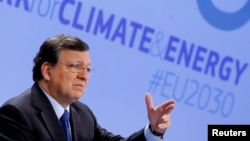PARIS —
The European Union's executive arm has unveiled what it calls an ambitious new climate change and energy policy for the 28-member bloc.
Europe has been hailed as a leader in fighting greenhouse gases. But a year before a key United Nations climate change conference, critics say the EU's proposals don't go far enough.
With cuts in greenhouse gas emissions, more renewables and greater energy efficiency by 2030, the new climate and energy proposals make environmental and business sense, according to European Commission President Jose Manuel Barroso, who unveiled the draft package in Brussels.
"An ambitious and smart 2030 strategy will contribute to Europe's share in global climate action," he said, "but will also help to reduce our costly dependence on imported gas and oil [and] boost our green technology industry and sustainable growth, by providing a stable long-term perspective for our companies to invest,"
The strategy proposes binding 40-percent cuts in greenhouse gas emissions by 2030, compared to 1990 levels. Renewables must also comprise at least 27 percent of Europe's energy mix by that date. The proposal also aims to make energy production more efficient and competitive, and to shore up the EU's carbon emissions trading market - the world's largest.
Barroso says Europe wants to shape the debate ahead of a 2015 United Nations climate change conference in Paris.
"Coming with our proposals now, having already…a debate in the European Council in March, will enable [us] to keep the leadership role and also help shape the global climate action," he said.
Europe already has some of the world's most far-reaching climate change policies. But environmental groups like Greenpeace say these new proposals aren't ambitious enough. For example, Greenpeace's EU policy director, Joris den Blanken, says Europe needs to cut its greenhouse-gas emissions by at least 55 percent by 2030.
"This proposal for 40-percent emission cuts is not adequate to hold global warming within safe levels," den Blanken said. "Moreover, we're seeing that the EU, with this proposal, is backtracking on clean energy. Over the last 15 years, a lot of jobs are created with clean-energy investments. It was good for the EU's energy security. But the ambition level in this proposal will give a lot of uncertainty for investors in this sector and put clean energy in Europe at risk."
Experts warn that climate change may produce drastic results, including rising sea levels, desertification in some places and volatile weather patterns.
A recent draft report by the United Nations Intergovernmental Panel on Climate Change says foot-dragging by nations in fighting climate change has created a critical situation that will only get worse with time.
Europe has been hailed as a leader in fighting greenhouse gases. But a year before a key United Nations climate change conference, critics say the EU's proposals don't go far enough.
With cuts in greenhouse gas emissions, more renewables and greater energy efficiency by 2030, the new climate and energy proposals make environmental and business sense, according to European Commission President Jose Manuel Barroso, who unveiled the draft package in Brussels.
"An ambitious and smart 2030 strategy will contribute to Europe's share in global climate action," he said, "but will also help to reduce our costly dependence on imported gas and oil [and] boost our green technology industry and sustainable growth, by providing a stable long-term perspective for our companies to invest,"
The strategy proposes binding 40-percent cuts in greenhouse gas emissions by 2030, compared to 1990 levels. Renewables must also comprise at least 27 percent of Europe's energy mix by that date. The proposal also aims to make energy production more efficient and competitive, and to shore up the EU's carbon emissions trading market - the world's largest.
Barroso says Europe wants to shape the debate ahead of a 2015 United Nations climate change conference in Paris.
"Coming with our proposals now, having already…a debate in the European Council in March, will enable [us] to keep the leadership role and also help shape the global climate action," he said.
Europe already has some of the world's most far-reaching climate change policies. But environmental groups like Greenpeace say these new proposals aren't ambitious enough. For example, Greenpeace's EU policy director, Joris den Blanken, says Europe needs to cut its greenhouse-gas emissions by at least 55 percent by 2030.
"This proposal for 40-percent emission cuts is not adequate to hold global warming within safe levels," den Blanken said. "Moreover, we're seeing that the EU, with this proposal, is backtracking on clean energy. Over the last 15 years, a lot of jobs are created with clean-energy investments. It was good for the EU's energy security. But the ambition level in this proposal will give a lot of uncertainty for investors in this sector and put clean energy in Europe at risk."
Experts warn that climate change may produce drastic results, including rising sea levels, desertification in some places and volatile weather patterns.
A recent draft report by the United Nations Intergovernmental Panel on Climate Change says foot-dragging by nations in fighting climate change has created a critical situation that will only get worse with time.




